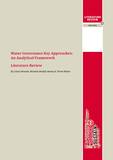|
One of the aims of the research project “Change2Sustain: Urban Opportunities – Urban Growth and The Sustainability Challenge” [Chance2Sustain] is to understand better to what extent, and how, citizens and governments mobilize, operate and co-operate to reduce urban inequalities. Hence a work package (WP3) deals with policies and politics to address urban inequality. Focal points are the ‘slums’, or what we prefer to define as sub-standard or informal settlements, in metropolitan areas.
Case studies in four countries – India, South Africa, Brazil and Peru - try to answer a variety of questions: Which roles do poor people networks and civil society organizations play in order to upgrade sub-standard settlements and make them survive? What are the contents of government policies towards sub-standard settlements? Are these policies responses to social mobilizations? Do they cause demobilization or increased mobilization? Do the policies result in sustainable improvements of sub-standard settlements and in reduced socio-spatial segregation in the cities?
A conceptual and methodological framework for the studies was elaborated in 2010. A group of highly committed and skilled researchers have carried out fieldwork in the selected cities and settlements in 2011 and 2012. This publication compiles the fieldwork reports. The next steps are to develop the analysis of the settlement cases within the context of each city and country, and finally to compare the findings from the settlement cases across the cities and countries.
Chance2Sustain Fieldwork Report Series - ISSN 2309-8201 |
Recent Chance2Sustain Publications |
|
|
|
|
|

